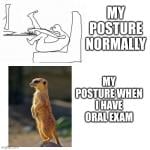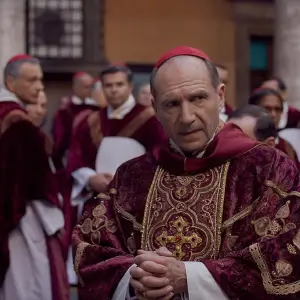Oral Exams and Conclaves
Last week was final exam week–I administered 32 written exams and held 34 oral exams (25-30 minutes each) in my office. I greatly prefer oral to written exams and would love for all exams in my courses to be oral. But one week doesn’t provide enough time for that, so I made oral exams optional in two of my three courses.
Oral exams tend to run together when you have seven or eight of them per day for five straight days. But some of them are memorable. I always end an oral exam with the same hypothetical question: Ten years from now, suppose you are back on campus for your ten-year class reunion. You get into a conversation with someone who was in this class with you and you realize that you haven’t thought much about the class since your oral exam. But once you start thinking about it, you realize that there was one thing from the course that really stuck with you. What would that thing be?
Questions and Doubts Remained
One of the students from my American Philosophy class answered the question by telling a personal story. Raised Catholic in a devout family, she went to twelve years of Catholic school before college, regularly attending mass with her family while hitting all of the Catholic mile markers such as baptism, first communion, confession, and CCD along the way. But there was a problem, a problem that I recognized clearly from my own religious upbringing–she had doubts. Not all the time, but frequently enough to both raise questions and cause guilt. No one else in her family or circle of Catholic friends expressed such doubts, so she assumed there was something wrong with her. But the questions and doubts remained.
Now as a twenty or twenty-one year old college junior, she told me what the one thing from our class that would stick with her the most is that “it is okay not to be sure.” Our course focused primarily on “pragmatism,” arguably the unique and most important American contribution to the Western tradition in philosophy. One of the most important and controversial aspects of pragmatism is its treatment of truth. Traditionally, an idea or belief has been considered as “true” if the idea matches up or “corresponds” to the way things actually are in reality. The pragmatists reject this correspondence theory, proposing instead an entirely different criterion as expressed by William James.
Pragmatism is an American Philosophy
Pragmatism . . . asks its usual question. ‘Grant an idea or belief to be true,’ it says, ‘what concrete difference will its being true make in any one’s actual life? How will the truth be realized? What experiences will be different from those that would obtain if the belief were false? What, in short, is the truth’s cash-value in experiential terms? . . . The truth of an idea is not a stagnant property inherent in it. Truth happens to an idea. It becomes true, is made true by events. Its verity is in fact an event, a process: the process, namely, of its verifying itself.
Truth is an event, not a fixed relationship between idea and reality. A belief or idea becomes true on the basis of its fruitfulness and cash-value. The truth of an idea is established by how well it works in terms of opening possibilities and positive pathways. Pragmatism is an American philosophy through and through. More to come in future posts.
Greater Than Us?
Back to my student. She went on to say that she carried a certain amount of self-consciousness and guilt into her early adulthood because of her doubts about what she thought she was supposed to be certain about. In this class she learned of a different way of thinking about belief, a way that not only embraces but requires doubt and constant revision. The pragmatists ask what one should do when a belief or set of beliefs has gone stale or no longer is meaningful. Their answer is to change your belief. This is controversial in any area of belief, but particularly so when applied to faith.
My student, as the vast majority of religious believers, had been taught that one’s beliefs concerning what is greater than us cannot be challenged. Certainty is a sign of faithfulness, while doubt is a sign of weakness or, at worst, apostasy. But as she told me in her oral exam, being given the permission to doubt, to suppose that her faith will be a matter of continual growth and change, was life-giving. Both she and I were smiling as she left my office when her oral exam ended.
Doubt Serves Faith

This student’s oral exam was early in the week, so on that day, the new pope had not yet been selected. The conclave was in session and who knew when the white smoke would be produced. Jeanne and I had watched the movie “Conclave” the previous weekend on Amazon Prime in anticipation. We had seen the movie at our usual movie complex when it was in the theatres and were not particularly impressed. This time I liked it better, particularly the sermon by Cardinal Lawrence (played by Ralph Fiennes). Here’s an excerpt:
My brothers and sisters, in the course of a long life in the service of our Mother the Church, let me tell you that the one sin I have come to fear more than any other is certainty. Certainty is the great enemy of unity. Certainty is the deadly enemy of tolerance. Even Christ was not certain at the end. He cried out in His agony at the ninth hour on the cross, “My God, my God, why have you forsaken me?” Our faith is a living thing precisely because it walks hand in hand with doubt. If there was only certainty, and if there was no doubt, there would be no mystery, and therefore no need for faith.
Let us pray that the Lord will grant us a Pope who doubts. Let Him grant us a Pope who sins, and asks forgiveness, and carries on.
Early signs are that Leo XIV is well aware that certainty is the enemy of faith and that faith and doubt go hand in hand. Good news for everyone.













